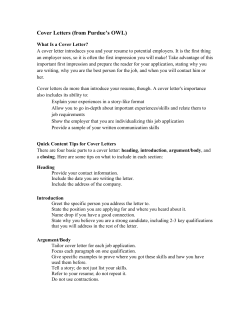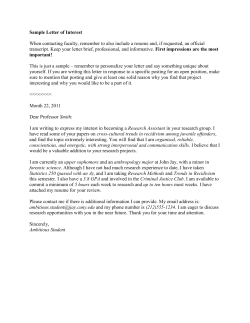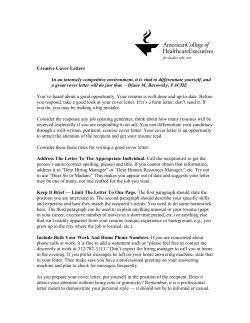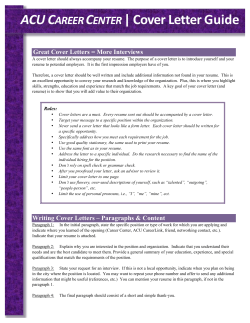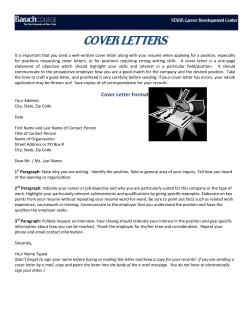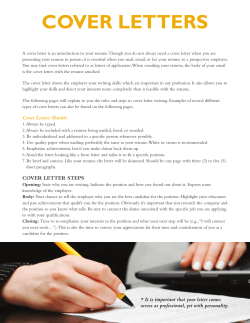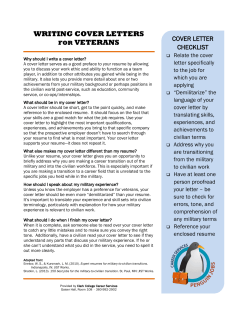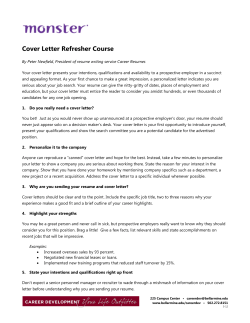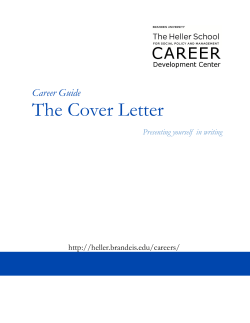
The Human Tendency to Infer the Worst:
The Human Tendency to Infer the Worst: Why the Absence of a Proper Cover Letter Can Severely Damage Your Candidacy One of the most important lessons I learned as a legal headhunter was taught to me just a few weeks into my career. I was meeting with the recruiting manager of a large firm and she mentioned her firm’s high number of applicants and the challenges posed in terms of ―weeding‖ out candidates to a manageable number for interviews. Seems pretty normal, right? However, she then made a comment that really shocked and struck a chord with me. This comment was so powerful that it has directly influenced my recruiting practice and compelled me, years later, to write an article about it. 1. What Can Actually Happen Behind Closed Doors When Your Submission Materials are Being Reviewed Here’s what the recruiting manager said to me: “Dan, we get so many applicants and only have limited time for interviews. If there is any missing relevant information from a resume or cover letter, you‟d be amazed at how the hiring committee automatically infers the worst possible explanation and before you know it, these inferences become fact.” She went on to share a story that had stuck with her, personally, for years: [Upon reviewing a resume in a hiring committee meeting] Partner 1: “This candidate has a good resume, but why did he leave his last firm after only 10 months?” Partner 2: “I heard through the grapevine that somebody in that practice group was fired. Maybe it was him?” Partner 1: “Hmm. Does he mention in his cover letter why he left his firm after only 10 months?” Recruiting Manager: “No, the headhunter just wrote that he has „great experience‟ and is „interested in interviewing with us.‟” Partner 1: ―Hmm, maybe that is him. Let‟s put him in the “hold” pile and come back to him later. We‟ve got a lot more resumes to review.” When the recruiting manager circled back with the partner a few days later about that particular candidate, the partner commented, ―Oh, is that the one who was fired? Let‟s hold off on him right now – we don‟t want to inherit somebody‟s problems.‖ Naturally, my next question was, ―Well, did you ever find out if the person was actually fired?‖ Fortunately, the recruiting manager was very diligent and did call the candidate’s headhunter, who only then informed the recruiting manager that the candidate was not laid off (in fact, the candidate received a very good 6 months performance review), but left the firm because the partner with whom he worked exclusively was asked to leave due to a major conflict with another partner. Rather than stay with the firm and work in a totally different practice area, the candidate felt it made sense to focus exclusively on a job search in his chosen field, which is why he quit his job and did just that. Once the recruiting manager provided this new information to ―Hiring Partner 1‖, her response was, ―Oh, ok – let’s bring him in then.‖ The associate nailed his interviews and, according to the recruiting manager, remains the ―golden child‖ of the practice. 2. Almost All Attorneys Leave Out the Most Critical Information from a Resume and Cover Letter If you ask a hiring attorney in a law firm what he or she considers to be the most important information (aside from academics) when deciding to hire a lateral candidate, it’s usually: (1) Does this candidate have relevant experience and training to handle our work?; (2) Did this candidate perform well at his/her other jobs (including, ―Did the candidate meet the billables?‖); and (3) Will this candidate do well here? For some perplexing reason, in the world of attorney job searching, resumes only address number #1. While I strongly believe it’s extremely beneficial to do so, you will very rarely see legal resumes that discuss a candidate’s performance evaluations or billable hours, or reasons for leaving a prior employer. In terms of cover letters, the same problem exists. Candidates will typically take a paragraph to introduce their interest in the position, rehash the experience that is on their resume in a paragraph or two, and then explain in very generic terms that they are very interested in meeting with the firm. Why is the most critical information not expected to be included? I don’t really know, but I think perhaps it is rooted in candidates’ faulty assumptions that they will have the opportunity to explain all of the relevant background information during an interview. As you can see from the above story, this opportunity is often not given. 3. The Importance of a Comprehensive Cover Letter To be clear, I am not saying that a cover letter has to be very long in order to be useful. I am well aware of conventional wisdom that says, ―A cover letter should be no longer than one page because nobody has the time to read it.‖ This is sometimes true, but sometimes it could not be farther than the truth. a. For Candidates Using a Legal Headhunter If you are able to work with a headhunter, you have an excellent opportunity to have your background information presented in a compelling manner that you could not otherwise do yourself. Why? Because headhunters are speaking about you as a third-person, it is more acceptable to have them explain your background (and brag on your behalf!) through a well-crafted cover letter that can well exceed one page. (For some of my candidates, my cover letters need to be as long as 5 to 8 pages in order to sufficiently profile a unique career path.) A good headhunter will not only provide a detailed description of the legal skills you have gained, but will also be able to beautifully supplement your resume by providing important background information that is critical to your candidacy. If you are working with a headhunter, you should expect the headhunter’s cover letter to discuss not only your legal skills and experience, but your unique achievements, accomplishments, performance reviews, billable hours, and most importantly, your reasons for seeking another position. If you are moving cities, a cover letter should explain in detail your connection to the new city. [Quick Minor Detour] - What About Disclosing Negative Information in a Cover Letter? You may be thinking, ―What if my hours are low because my firm didn’t have enough work to go around? Won’t a cover letter hurt me?‖ Generally speaking, and based on very much experience, I believe that up front honesty in a cover letter is by far the best policy, with one exception (discussed below). First, if you try to withhold what you consider to be negative information, it may not be nearly as negative as you perceive it to be, and may actually be much more common than you expect. Second, even if you think you are concealing negative information going into an interview, your body language (including eye contact), vocal pitch, and other cues will send the signal that something is not ―right.‖ While attorneys are not experienced lie detectors, they are pretty darn close—especially litigators—and can smell blood from a mile away. When they do, they will pounce on you (much more than they would if you were to preemptively raise any negative information yourself). And if, after being pried open like an oyster, you finally do come clean with negative information, your credibility is completely gone and you can be guaranteed that you will be receiving a rejection letter within a few weeks. We have seen many qualified attorneys not get offers because they tried to withhold relevant information that, if disclosed voluntarily, would never have ruined their chances of getting the job. It’s the act of withholding the information that causes the greatest damage, even if it is discovered after you start working at the new firm. Now the exception: if there is truly negative information that would reflect poorly on your judgment if you included it in a cover letter (if somebody reading your letter were to ask, ―Why would this person put THAT in a cover letter?‖) or if you truly feel that the negative information can only be conveyed appropriately in person during an interview, this is the exception that warrants leaving the information out of a cover letter to be discussed and preemptively brought up by you during an interview. Enough of the Negative Information/Honesty Debate – Back to Cover Letters Ok, ok, I’m getting off my ―honesty on interviews‖ soap box and back to cover letters. So, the point here is that a good cover letter written by a headhunter will be able to not only fill in all the questions that a firm might wonder when reviewing your materials (such as your reasons for leaving your job), but will also be able to highlight why you would make a good fit for the firm and why you are likely to succeed, based on the headhunter’s knowledge of both the firm and the candidate. Inherent Risks When Your Headhunter Says, “Don’t Worry About a Cover Letter – I’ll Call the Firm and Tell Them Your Information.” I firmly believe that drafting a strong cover letter is among of the most important forms of added value a good headhunter can add to your candidacy. When I was an attorney, I worked with a headhunter and I asked how she was going to relay my background information to the firm. She replied, ―Oh, I know people at the firm – I’ll just call and tell them about your additional background information.‖ At the time, that seemed like a perfectly fine answer. What I didn’t realize at the time—but what I know now—is that more often than not, this call is never made and resume and transcript is presented with a single lined email such as ―Enclosed please find an applicant for your ____ position.‖ And if the call is actually made, the information that is mentioned during a brief phone conversation can hardly be effectively distributed to all the different interviewers (usually, a note or two is just scratched in the file and often forgotten), and the risk of erroneous assumptions (as discussed above) presents itself again. With a solid cover letter that accompanies your resume and transcript, you are providing everybody with a document that contains all of your relevant background information, which is the only way to protect you from the risk of erroneous assumptions that nearly undermined the candidate in the story above. While there is no way you can guarantee that every interviewing attorney will read the entire letter prior to the interview, we have found that many of the interviewers do read every single word of the letters (and routinely comment favorably to our candidates). If they don’t read the entire letter, they usually glance at the headings which, by themselves, can provide very important background information. In sum, it makes the interviewer’s job easier by providing them with relevant information at their fingertips, and this reflects very well on you as a candidate. Given the importance of cover letters for purposes of filling in missing critical information—and the dangerous risks that accompany the absence of a cover letter—this is perhaps the most important way a good headhunter shows his or her commitment and dedication to investing in your job search. b. For Attorneys Applying Directly to a Firm (Not Through a Headhunter) If you are not using a legal headhunter, you should try to limit your cover letter to discussing not only your qualifications, but your reasons for seeking a new position, an explanation of any prior job moves on your resume, and any relevant accomplishments that would be of interest to your new firm. If you are not sure of what critical information to include in a cover letter, take a look at your resume as if it was from somebody you were interviewing at your job. Then, with a critical eye, pick out questions that you yourself would have about this person’s background and reasons for seeking a new position. As a rule of thumb, include your reasons for seeking a new opportunity. In terms of your accomplishments, a good way to ―brag without bragging‖ is to include a sentence such as, ―While I very much enjoy my colleagues and am in very good standing at my firm, I am interested in your firm because of its strong regulatory health care practice, which is not present at my current firm.‖ Also, you should include a sentence or two with specific reasons as to why you believe you would be a good fit for the firm. CONCLUSION By following the above advice—admittedly unconventional but proven to be extremely effective in my recruiting practice—you are not only protecting yourself from falling victim to an interviewer’s human tendency to infer the worst about missing information, but also giving yourself an advantage over the other candidates who leave this useful information out. *Dan Binstock is a partner with Garrison & Sisson in Washington, DC where he focuses exclusively on permanent attorney placements. He can be reached at (202) 559-0472 or dbinstock@g-s.com. Prior to joining Garrison & Sisson in 2010, he managed the Washington, DC office of BCG Attorney Search (during which time this article was written).
© Copyright 2025


